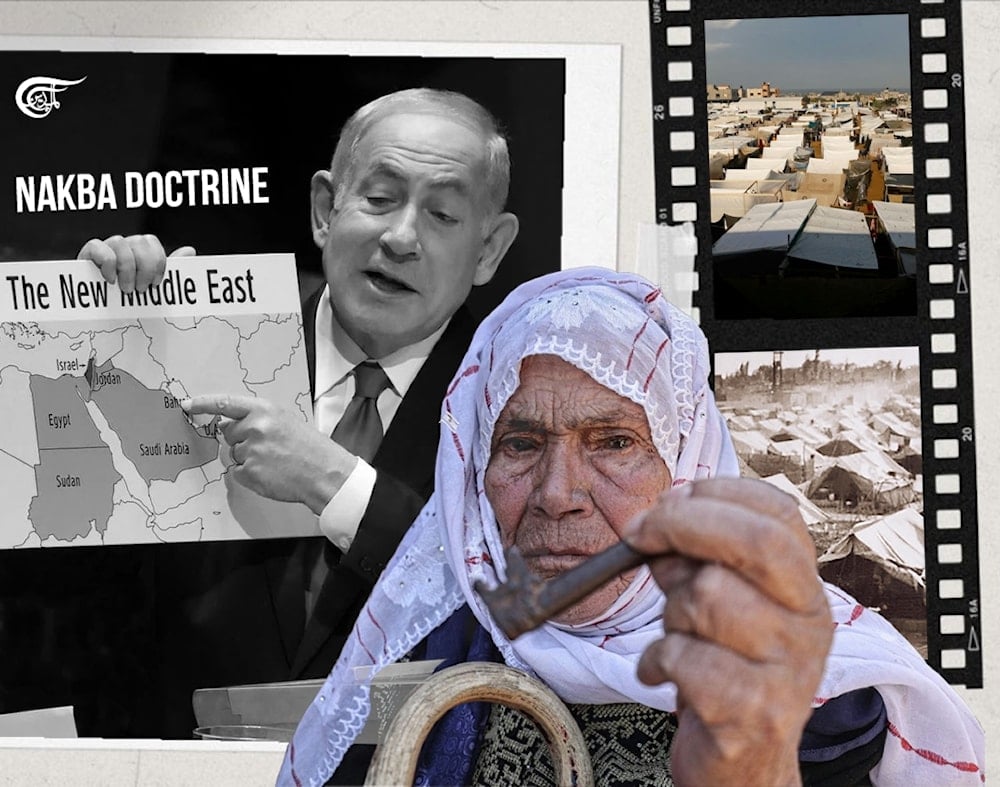'Israel’s' ‘Nakba Doctrine’
As "Israel" swings towards a Biblical "Greater Israel", the Islamic world turns increasingly uncompromising.
-

With the ‘Nakba Doctrine’ taking a hold, so favourable conditions for the release of hostages (which Hamas predicates upon a lengthy ceasefire and humanitarian supplies) melts away. (Al Mayadeen English; Illustrated by Arwa Makki)
"We are now actually rolling out the Gaza Nakba", says Avi Dichter, "Israel's" Minister for Agriculture and former head of Shin Bet. The Israeli cabinet has been briefed that up to 1,700,000 Gazans (out of a total population of 2.2 million) are no longer able to live in their own homes, either because they've been ‘displaced’, or because their homes have been destroyed/damaged.
To project the image of the Israeli military as ‘bounding ahead’ with its operation to eradicate Hamas however, we see many videos of tanks and armoured personnel carriers around Gaza City -- but by contrast, observe notably few images of IOF soldiers patrolling on foot – either to protect the tanks, which are subject to sniper or RPG fire, or (as many commentators suspect) out of fear of Israeli casualties.
Plainly, "Israel" sticks to their armoured vehicles, though they are taking regular losses of their vehicles from ‘flash’ mini squads of Hamas fighters emerging suddenly from concealed tunnels to destroy the vehicles – before disappearing again underground.
The IOF has entered Gaza City, progressing a couple of kilometres over the month, yet showing no serious evidence to date of having encountered the Hamas’ forces, nor having eliminated an appreciable number of them. Why?
Simply put, the Israelis are fighting a conventional war-model (an armoured ‘fist’ inching ahead under massive air support). But the contradiction to this model is blatantly obvious: the so-called ‘enemy’ on the ground simply are civilians, who are dying in horrifying numbers, whilst the Hamas forces remain intact, deep underground. That, too, is where the Hamas infrastructure lies.
The contradictions inherent to this approach lie rooted in the IOF's evolution over decades to become a quasi-colonial police force, used to policing occupation through the twin vectors of massive force, plus absolute force protection. It is no secret that the IOF fears to engage in hand-to-hand firefights with Hamas units in the tunnel complex (for which their fighters are not adapted). So instead, we have a show of armoured vehicles parading on the surface, coupled with largely unsubstantiated IOF claims of damage inflicted on Hamas.
The most obvious contradiction is the Israeli Cabinet’s claim that the near non-existent military pressures on Hamas per se, are creating the conditions for the releasing of hostages; whereas the real pressure -- the incessant air strikes – that are devastating the civilian population and its infrastructure (hospitals, schools, bakeries and refugee camps), is facilitating a second Nakba -- more than any hostage release.
Maybe Hamas will release more hostages (calculated in terms of its strategic aims). If so, this likely will be construed – wrongly – as Hamas feeling pain. The conclusion, therefore, may be drawn that carpet bombing ‘works’. As Zvi Bar’el outlines in the liberal Israeli daily, Haaretz:
"According to Israel’s conception, the humanitarian crisis is part of an arsenal at its disposal, which can be used not just as a bargaining chip in negotiations over the release of hostages. Its role is to sear into Palestinian consciousness the apocalyptic punishment facing anyone who from now on dared challenge Israel.
This is a continuation of the deeply rooted strategic concept according to which humanitarian suffering might yield security-related gains …
More importantly, the humanitarian crisis in Gaza now gives Israel diplomatic leverage which includes getting concessions … Above all, it entails a defanging of the American rush to reach a two-state solution."
The ineluctable logic to this analysis therefore is to continue with the status quo: If it isn’t working in respect to freeing hostages, or degrading Hamas, it can be presented to the Israeli public as ‘working’ through forcing civilians to flee their devastated communities (what Dichter calls the "Gaza Nakba").
With the ‘Nakba Doctrine’ taking a hold, so favourable conditions for the release of hostages (which Hamas predicates upon a lengthy ceasefire and humanitarian supplies) melts away. The IOF can have one or the other: Either continuous destruction, or conditions for hostage releases. (It seems the cabinet has opted for the former.)
The other (more profound) dilemma is that international pressures for a ceasefire (and hostage release) are accumulating. Time is short, and the military operation may be required to cease. The issue for the Netanyahu Cabinet is -- once stopped -- will it be possible to resume the massacres of civilians and the Gaza Nakba pressures?
In this context, Israeli popular sentiment -- even amongst former liberals -- is moving toward a Greater Nakba. Gaza is under Nakba pressures. So is the West Bank, as settler violence against Palestinians surges. Even a ‘liberal’ such as former opposition leader Lapid now agrees that ‘settlers’ in the occupied West Bank are not ‘settlers’ at all, since the land is but the ‘Biblical land of Israel’.
Nakba ‘ambitions’ are widening to South Lebanon (up to the Litani River) too. The radical members of Netanyahu’s government say Israelis will never return to the kibbutz adjacent to Lebanon, without Hezbollah’s removal from the border area.
So, the call is heard for "Israel" to ‘take’ Lebanon up to the Litani (a key water source) -- and ‘serendipitously’ the Israeli air force has begun operating up to 40 kms inside Lebanon. Cabinet members now openly speak of the IOF needing to turn its attention to Hezbollah once Hamas has been ‘obliterated’.
The northern border inevitably is heating up. Hezbollah is using its more sophisticated, and more lethal weaponry against IOF positions in northern "Israel" as the ‘rules’ of engagement continuously blur. And "Israel" is responding, with attacks shifting ever deeper into South Lebanon (ostensibly to strike at Hezbollah’s rear infrastructure).
Last night the Israeli War Cabinet voted for striking a major blow at Hezbollah -- but Netanyahu demurred. The US reportedly suspects that "Israel" is provoking Hezbollah, hoping to entice the US into a war on Lebanon.
Plainly, the White House is struggling to avoid the slide towards full regional war, as both the Lebanese front and the Iraqi front heats up: On Sunday, Iraqi movements again fired missiles at the American base in Shaddadi.
"Israel" is sensing the present crisis to be both an existential risk, but an ‘opportunity’ too – an opportunity to establish "Israel" across ‘its Biblical lands’ over the long term. There is no mistaking it -- this is the direction of travel of Israeli popular sentiment, from both Left and Right wings, to bloody eschatology.
As one prominent Israeli commentator wrote after watching (the unsubstantiated) 47-minute IOF film on the 7 October events:
"After seeing the film I have no compassion for any person in Gaza, not a woman, not a child, and certainly not a man. Everyone deserves a painful death, you were all complicit in this massacre. I hope that no one is left alive in Gaza, period! … I am sure that your God despises you, is ashamed of you, and would burn you in hell, just as the IDF is doing to you now".
The ‘tribe of Amalek’ today is quoted widely. (King Saul, in the first Book of Samuel, commands Samuel to kill every person of the Amalekites: "Do not spare them; put to death men and women, children and infants, cattle and sheep, camels and donkeys").
As the Israeli mood swings Biblical, so the global majority’s anger rises. And so Muslims come to see the crisis as an uncompromising civilisational war -- The West versus ‘us’.
The concomitant two conferences -- the Arab League and the OIC (held concurrently in Riyadh) -- underlined the complete collapse of "Israel’s" image across the Islamic world. The outpouring of anger and passion was palpable, and is metamorphosing new global politics.
In the West, the anger is splintering mainstream political structures, and causing wide convulsion. Global protests are massive.
Thus, as "Israel" swings towards a Biblical "Greater Israel", the Islamic world turns increasingly uncompromising. Though the conferences did not agree on any action-plan, the image of President Raisi sitting next to MbS; and that both Presidents Erdogan and Assad were co-mingling at the conference, was arresting.
The strategic implication is stark: Israelis now abjure the risks of living with Muslims, and the sentiment is fully reciprocated by Palestinians towards Hebraic zealotry. The old paradigm for a political solution is rendered obsolete.

 Alastair Crooke
Alastair Crooke
 7 Min Read
7 Min Read











